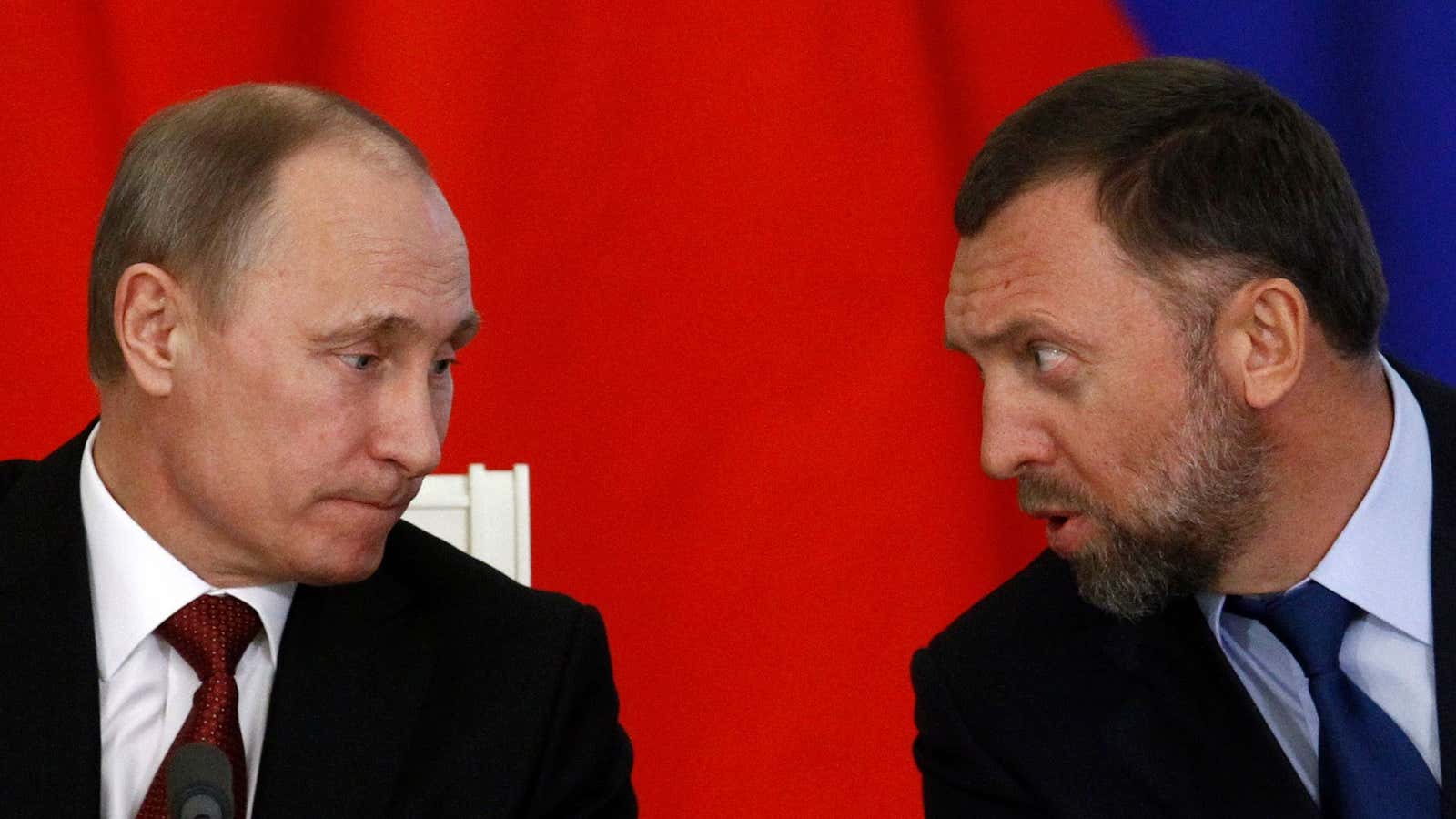The US Treasury Department announced yesterday (Jan. 27) that it had ended sanctions on three companies controlled by Russian oligarch Oleg Deripaska, a close ally of president Vladimir Putin. Sanctions on Russian energy giant EuroSibEnergo, aluminum producer UC Rusal, and Rusal’s parent company, En+ Group, were lifted after just 10 months, despite strong objections from members of both parties in Congress.
Lloyd Doggett, a Texas Democrat who serves on the House Ways and Means Committee, told Quartz the move is a “sordid deal,” adding “the Trump Administration is working seven days a week with favoritism for Russia.”
“This represents just one more step in undermining the sanctions law, which President Trump has obstructed at every opportunity, while Russian aggression remains unabated,” Doggett said.
When the sanctions were imposed in April, the Treasury Department’s Office of Foreign Assets Control (OFAC) said Deripaska—who has had close ties to Paul Manafort, the former Trump campaign chairman who is now a convicted felon—admits that “he does not separate himself from the Russian state.” Deripaska has “acknowledged possessing a Russian diplomatic passport, and claims to have represented the Russian government in other countries,” the OFAC release continued. “Deripaska has been investigated for money laundering, and has been accused of threatening the lives of business rivals, illegally wiretapping a government official, and taking part in extortion and racketeering. There are also allegations that Deripaska bribed a government official, ordered the murder of a businessman, and had links to a Russian organized crime group.”
After the sanctions were officially lifted, En+ announced the addition of seven new directors to its board, none of whom have “business, professional, or family ties to Deripaska or any other designated person”—one of the conditions the US insisted upon before removing the sanctions. Three are Russian, two are British, and two are American. All were vetted and approved by Treasury officials, the US said.
Look who’s on board now
According to bios released by En+, they include Nicholas Jordan, former co-CEO of Goldman Sachs’s Russia business; Carl Hughes, ex-vice chairman of Deloitte’s global energy and resources division; Joan McNaughton, who served as the UK’s director general of energy; and Christopher Bancroft Burnham, chairman and CEO of Cambridge Global Capital LLC, a private investment advisory firm with offices in San Francisco, Chicago, and Washington, DC.
“Mr. Burnham is a globally recognised expert in the implementation of accountability and transparency, and the implementation of best practice in government, corporations, and inter-governmental organisations, having served as Under Secretary General for Management of the United Nations [where he worked alongside Trump’s current national security adviser John Bolton] and Under Secretary of State for Management (acting),” the En+ release says. “Mr. Burnham is a former Vice Chairman at Deutsche Bank Asset Management and co-founded and led Deutsche Bank’s direct private equity group, RREEF Capital Partners. Mr. Burnham is also a former Assistant Secretary of State for Resource Management and Chief Financial Officer of the US Department of State.”
The En+ release makes no mention of one other notable position Burnham also held: member of Donald Trump’s presidential transition team.
Burnham’s office did not respond to a request for comment, nor did Deripaska’s. OFAC directed Quartz to a statement posted on its website but declined to provide further details about Burnham’s appointment.
Unlike his companies, Oleg Deripaska will personally remain under US sanctions. But although the US is demanding that Deripaska’s stake in En+ be reduced to less than 50%, legislators on both sides of the aisle say the stakes owned by Deripaska’s ex-wife, ex-father-in-law, and a foundation run by Deripaska will still amount to more than 50% of the overall shares.
An inside man
Doggett said Deripaska’s deal amounts to little more than “a shell game [that] only encourages Putin to pursue his destabilizing activities around the world.”
“It’s clear that government officials or wealthy individuals can exert control without having to own shares or control the management outright,” Mark Hays, a money laundering investigator at anti-corruption NGO Global Witness, told Quartz. “They often do it through middlemen or fixers that make their intentions known without having their names on the books, so to speak. While changing the nominal ownership of the company could address some concerns, a person like Deripaska could continue to control the company by other means.”
Still, Hays said OFAC “has a pretty good history…that at least gives them a fighting chance of targeting the individual in question.”
Burnham, who served in the US Marine Corps Reserve and has been described by former UN colleagues as almost “too pro-US,” had been involved in politics since long before Trump took office. He worked for US secretaries of state Colin Powell and Condoleezza Rice during the George W. Bush administration and was appointed to a high-ranking position at the UN by secretary general Kofi Annan. His private-sector experience includes six years as vice chairman and managing director of Deutsche Bank Asset Management.
“He’s a reliable conservative hand in international diplomacy and international business,” Hays said, “and someone thought it would be a good idea to put him on the board [of En+].”
Read OFAC’s conditions for En+’s removal from the sanctions list here:
